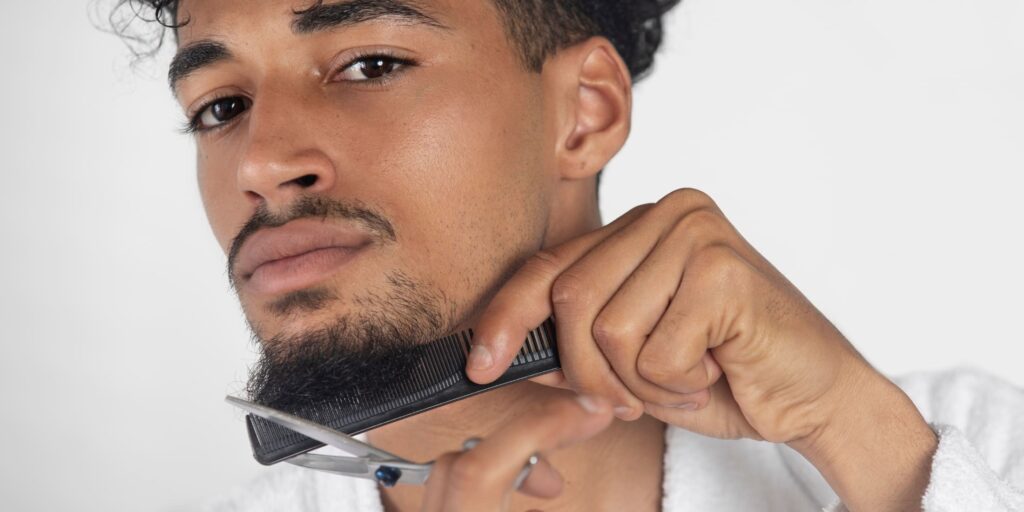Let’s be real, guys—self-care for men isn’t just about scented candles and face masks (although, no shame if that’s your thing!).
It’s about making sure you’re at your best so you can tackle whatever life throws your way.
We’re talking more energy, less stress, and boosted confidence—all from just a few simple habits.
So, buckle up and get ready to learn how to level up your life—because self-care isn’t a luxury, it’s a necessity!
Top 4 Benefits of Self-Care for Men
Alright, fellas, let’s get real for a second—self-care isn’t just about bubble baths (no judgment if that’s your thing!).
It’s about taking care of your body, mind, and overall well-being.
Here are the top 4 benefits of self-care for men that’ll have you ready to kick back and take care of YOU.
Boost Your Confidence
Ever noticed how good you feel after a fresh haircut or a solid workout?
That’s because self-care boosts your confidence.
When you look good, you feel good—it’s science!
- A consistent skincare routine = fewer breakouts and healthier skin
- Regular grooming and fitness routines = walking with your head held high
Feeling confident can change how others see you and, more importantly, how you see yourself.
So, yeah, take pride in your appearance!
Reduce Stress (And Feel Like a Boss)
Work deadlines, family responsibilities, life—it’s a lot.
But taking time for self-care? Total stress buster.
Whether it’s a quick jog, a bit of meditation, or just chilling with your favorite hobby, making time for yourself helps manage stress and keep burnout at bay.
Stress-relieving self-care could look like:
- A daily 10-minute meditation to clear your head
- A solo walk outside to soak up some sunshine
- Catching up with a good book or podcast
The more relaxed you feel, the more you’re able to handle whatever life throws your way.
Better Physical Health
Taking care of yourself isn’t just about pampering—it’s about keeping your body in top shape.
When you prioritize fitness, nutrition, and rest, your body rewards you by feeling energized and ready to conquer the world (or at least your to-do list).
- Exercise helps improve heart health, muscle strength, and mood (hello, endorphins!).
- Sleep? It’s your secret weapon for staying sharp and focused.
- A balanced diet fuels your body with everything it needs to keep running smoothly.
Being healthy is the ultimate power move.
Improved Mental Health
Let’s face it, mental health can be tough to talk about, but it’s so important.
Practicing self care for men isn’t just about the outside—it’s about nurturing your mind, too.
- Regular self-care can help you manage anxiety and reduce feelings of overwhelm.
- It gives you the mental space to process emotions and maintain a positive outlook.
Remember: Strong mental health = a stronger you.
So, whether you’re just dipping your toes into the world of self care for men or you’re already on the path to feeling your best, these benefits are here to level up your life.
It’s not about being perfect—it’s about showing yourself a little love and attention.
Now we have gone over the benefits of self care for men, let’s jump straight into the top 8 things you can do for yourself.
Prioritize Physical Fitness: Feel Strong, Stress Less

When it comes to self-care for men, physical fitness is one of the best things you can do for your body and mind.
The good news?
You don’t need hours at the gym—just a little movement can make a big impact.
Here’s why fitness is key:
- Increased Energy: Regular exercise gives you a natural energy boost, making you feel more alert and ready to tackle your day.
- Stress Relief: Work stress? Family stress? Life stress? Exercise is a natural stress-buster that helps you shake off the tension and reset.
- Improved Mood: Thanks to those magical endorphins, even a short workout can leave you feeling happier, more relaxed, and ready to take on whatever life throws your way.
Simple ways to fit it in:
- At home: Try quick a bodyweight workout with exercises like squats, push-ups, or a 10-minute stretch routine.
- Outdoors: Go for a brisk walk, a jog, or even a hike to clear your head while staying active.
New to working out? Start small! Try easy, beginner-friendly exercises and build up gradually. You don’t have to lift heavy or run far to feel the benefits.
Fitness doesn’t have to be complicated.
Even short, regular workouts can boost your energy, reduce stress, and improve your overall mood.
Plus, it’s a simple but powerful way to invest in your health.
Create a Skincare Routine: Keep it Simple, Stay Fresh

Taking care of your skin isn’t just about looking good—it’s a key part of self-care for men.
You don’t need a dozen fancy products or hours in front of the mirror.
A simple routine will do wonders for your skin and confidence.
Here’s why it matters:
- Healthy Skin = Confidence Boost: A clear, fresh face makes you feel more confident and ready to tackle the day.
- Prevents Aging: A little care now goes a long way toward keeping your skin looking younger for years.
- Takes Only Minutes: A basic routine is quick and easy to follow, even if you’re always on the go.
Easy Skincare Steps for Men:
- Cleanse: Wash your face daily to remove dirt, oil, and grime. Think of it as a fresh start for your skin.
- Moisturize: After cleansing, use a moisturizer to hydrate your skin and keep it looking smooth and healthy.
- SPF is Key: Sunscreen isn’t optional. Protect your skin from the sun to prevent wrinkles and sun damage.
New to skincare? No worries! Start with these basics, and you’ll be surprised at how big a difference they make.
A simple skincare routine can keep your skin looking fresh, boost your confidence, and prevent aging.
All it takes is a few minutes a day!
Maintain a Balanced Diet: Fuel Up, Feel Great

When it comes to self-care for men, what you eat is just as important as hitting the gym or getting enough sleep.
A balanced diet isn’t about restriction—it’s about giving your body the right fuel to keep you feeling awesome.
Here’s why it matters:
- Boosts Energy: Eating the right foods keeps your energy levels steady throughout the day, no more afternoon slumps.
- Supports Physical Health: A diet rich in nutrients keeps your body strong and healthy, inside and out.
- Improves Mood: The food you eat can directly impact your mood. Healthy food = happy brain!
Easy Tips for a Balanced Diet:
- Protein is Power: Lean meats, eggs, fish, or plant-based proteins (like beans) give your muscles the fuel they need to stay strong.
- Healthy Fats: Foods like avocado, nuts, and olive oil are great for your heart and help keep you full.
- Don’t Forget Veggies: Add some color to your plate with leafy greens, carrots, peppers—whatever you enjoy. They’re packed with vitamins and fiber!
New to meal planning? Keep it simple. Try prepping easy meals ahead of time to avoid the fast-food trap during a busy week.
A balanced diet fuels your body, boosts energy, and keeps you feeling great.
The best part?
It doesn’t have to be complicated—just a few healthy choices each day make all the difference!
Prioritize Mental Health: Your Mind Deserves Care Too

When it comes to self-care for men, mental health is just as important as physical health.
Taking care of your mind keeps you grounded, focused, and ready to handle whatever life throws at you. And trust me, it’s not as tough as it sounds!
Here’s why prioritizing mental health matters:
- Reduce Stress: Life can be overwhelming, but managing stress through mental self-care can help you feel more in control.
- Boost Mood: Regular mental health care can lift your spirits and keep you feeling positive.
- Improve Focus: A clear, calm mind helps you stay sharp and productive in everything you do.
Simple Ways to Prioritize Mental Health:
- Meditate: Even just 5 minutes a day can help calm your mind and reduce stress.
- Journal: Writing down your thoughts is a great way to release stress and organize your mind.
- Talk It Out: Whether it’s with a friend, family member, or therapist, sometimes you just need to get things off your chest.
New to mental health care? Start small—try one of these activities for just a few minutes each day and see how it feels.
Taking care of your mental health is key to feeling balanced, focused, and stress-free.
A few simple habits can go a long way in making you feel your best, inside and out!
Get Adequate Sleep: Recharge Like a Pro

Sleep is not just for lazy Sundays—it’s a major part of self-care for men.
A good night’s sleep does wonders for your energy, mood, and overall health.
So, if you’ve been skimping on your Z’s, it’s time to make sleep a top priority!
Here’s why sleep is a game-changer:
- Boosts Energy: 7-8 hours of quality sleep keeps you energized and ready to tackle the day like a boss.
- Improves Mood: Well-rested = happier and less irritable. Sleep is the ultimate mood booster!
- Sharpens Focus: Sleep helps your brain process information and makes you more productive and focused.
Simple Tips for Better Sleep:
- Set a Routine: Try to go to bed and wake up at the same time every day. Your body will thank you!
- Limit Screen Time: Avoid phones and laptops an hour before bed to help your brain wind down.
- Create a Sleep-Friendly Environment: Make your bedroom cool, quiet, and dark for the best sleep.
New to sleep hygiene? Start by setting a regular bedtime, and gradually add in other sleep-boosting habits.
Getting enough sleep is essential for feeling your best.
With a few easy changes, you’ll wake up refreshed, energized, and ready to take on the day. Sleep tight!
Develop a Personal Grooming Routine: Look Good, Feel Great

Let’s face it, guys—looking after your appearance isn’t just for special occasions.
A solid personal grooming routine is an essential part of self-care for men.
It’s all about keeping yourself fresh, confident, and ready for whatever comes your way!
Here’s why grooming matters:
- Boosts Confidence: When you look your best, you feel your best. Simple as that!
- Improves Hygiene: Regular grooming keeps you clean, fresh, and smelling great.
- Professional Look: Whether it’s for work or your personal life, a sharp appearance helps you make a great impression.
Easy Grooming Tips:
- Hair & Beard Care: Keep your hair trimmed and neat, and give your beard some love with regular maintenance.
- Skincare: A quick face wash and moisturizer go a long way toward healthy, glowing skin.
- Nail Care: Don’t forget your hands! Trim and clean your nails regularly for a polished look.
New to grooming? Start simple. Just a few minutes a day is all it takes to keep things fresh.
A personal grooming routine doesn’t have to be complicated, but it does wonders for your confidence and hygiene.
Stay fresh, stay sharp, and you’ll always be ready to tackle the day!
Make Time for Hobbies and Relaxation: Chill Out and Recharge

Life’s busy, but guess what? You deserve some downtime!
Making time for hobbies and relaxation is a key part of self-care for men.
It’s not just about taking a break; it’s about doing the things that make you happy and help you unwind.
Because let’s be real—you can’t pour from an empty cup!
Here’s why it matters:
- Stress Relief: Hobbies and relaxation give your mind a break from the daily grind.
- Boosts Creativity: Taking time for yourself often sparks fresh ideas and new perspectives.
- Improves Mood: Doing something you love instantly boosts your mood and overall well-being.
Easy Ways to Relax and Have Fun:
- Find a Hobby: Whether it’s playing an instrument, gardening, painting, or even gaming—do what makes you feel good!
- Get Outside: Fresh air and a walk in nature are simple ways to relax and recharge.
- Unplug: Take a break from screens and spend time doing something offline—read a book, cook, or just chill.
New to relaxation? Start small. Set aside just 15-20 minutes a day for a hobby or a little quiet time to reset.
Taking time to relax and enjoy hobbies isn’t a luxury—it’s essential for recharging your mind and body.
So go ahead, make some “me-time,” and watch how it transforms your energy and mood!
Build Strong Social Connections: Your Crew = Your Superpower

When it comes to self-care for men, staying connected with your friends and loved ones is just as important as hitting the gym or eating right.
Humans are social creatures, and strong relationships are a key part of a happy, healthy life.
Whether it’s hanging out with your buddies or spending time with family, building and maintaining those connections can do wonders for your well-being.
Here’s why it matters:
- Reduces Stress: Spending time with people you care about helps you relax and forget the stress of daily life.
- Boosts Happiness: Good conversations and laughter with friends are instant mood lifters.
- Provides Support: In tough times, a strong support system makes everything feel more manageable.
Easy Ways to Strengthen Social Connections:
- Catch Up Regularly: Schedule a weekly chat or grab coffee with a friend to stay in touch.
- Group Activities: Join a sports league, book club, or group workout to meet new people and build bonds.
- Stay Connected: Even a simple text or call can keep relationships strong, especially when life gets busy.
New to building connections? Start small. Reach out to one person you haven’t talked to in a while or plan a casual hangout with a friend.
Strong social connections aren’t just fun—they’re essential for your mental and emotional health.
So, make time for your crew and watch how much better life feels with the right people by your side!
Conclusion: Self Care for Men = A Happier, Healthier You!
Alright, guys, let’s wrap this up. By now, you know that self care for men isn’t just a buzzword—it’s your ticket to feeling awesome, inside and out.
Whether you’re squeezing in a workout, catching up with your buddies, or just taking a breather, self-care is about small steps that lead to big results.
Quick Recap of Self-Care Wins:
- More Energy: Regular exercise and proper sleep = a stronger, more energized you.
- Less Stress: Relaxation, hobbies, and social connections help you shake off the stress.
- Better Mood: A little self-care can do wonders for your mood and overall well-being.
- Increased Confidence: Grooming, fitness, and skincare routines help you look good and feel great.
So, what’s the takeaway? Self-care for men is not just important—it’s essential.
It’s the secret sauce to living a happier, healthier life.
Whether it’s getting more sleep, making time for your favorite hobbies, or spending time with your crew, these small habits add up to big benefits.
So, go ahead—take a little time for yourself. You’ve earned it.





